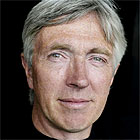Despite remaining loyal for years to a publisher who insisted on tiny print runs for her novels, despite writing idiosyncratically in neglect of literary fashion, despite missing out on literary prizes, Beryl Bainbridge has acquired a sizeable and devoted readership. She herself seemed a little bemused by the packed house for her visit to the book club, the first at the Guardian's new building. Many authors claim to write fiction to please themselves, without worrying about what any reader might think. When Bainbridge says this it sounds true. Yet her claims to guilelessness in the actual construction of her fiction aroused some scepticism.
She professed herself amazed at the thought that there were subtle time shifts or elaborately connected plot developments in Every Man for Himself. When presented with what appeared prima facie evidence she responded with lines that few literary novelists would venture: "Well I never. What was I thinking of?" Or (laughing) "That's terribly clever, isn't it? I don't know what it means." Yet a reader pointed out that she had said that you should read her novels three times if you were to get what was going on in them. She admitted it. "So many times someone has pointed out that they didn't understand what I meant."
Readers were always saying: "I had to read it again because I didn't know what that was leading to." She was reluctant to admit that this might be evidence of any narrative cunning on her part, but this seemed more like an unwillingness to use a certain literary-critical vocabulary. For she did tell us that she was glad that readers felt it necessary to reread any of her novels in order to puzzle them out. "I don't want to write something where someone knows where it is leading."
The audience was clearly intrigued by Bainbridge's unusual habits of composition. Is it true that she reads her novels out loud as she is writing? Yes, after she has finished a paragraph she performs it, because she likes to give sentences an audibly iambic rhythm. Does she really do paintings of each novel? Yes, "quite big ones", but after they have been written. What about the report that she acquires relics connected to the topic of the given novel? Well, it is true that when she wrote Young Adolf she did so in the company of a tailor's dummy in the likeness of the führer. Every Man for Himself, more prosaically, was composed beneath a large photograph of the Titanic.
She played down the research that she had had to do for her historical novels, yet it emerged, in her answers to later questions, that she liked to be exact about all material details. One reader asked her what she had thought about the film Titanic, released after she had completed writing her novel, and her first instinct was to complain about the director's poor sense of the ship's deck plan. "The man and the girl are on deck and they go through a door to the boiler room. That's ridiculous." You'd have had to go down into the depths of the ship. "Also they had four funnels belching smoke. But only three were used for that. So I was annoyed." Still, Bainbridge conceded, "what was good about that film" was its timing. "An awful lot of people" had seemed to think that her novel was the book of the film. "I was lucky."
What about love in the novel, asked one reader. "Whether love exists seems to be a bit of a question in Morgan's head. And the behaviour he witnesses seems to show him that it doesn't exist." What was more, she put some disheartening observations about love into the mouths of some of her cleverest characters. Scurra tells Morgan that only women experience love. Molly, fatalistic mistress to a Guggenheim, knows that "there is nothing true about love". To Bainbridge's consternation this led to her being asked whether she thought that love existed or not. Is life really just "every man for himself"? She pointed out that the book's counter-examples, Mr and Mrs Straus, the elderly couple who calmly decide to die together and sit in deckchairs watching proceedings "as though from the stalls of a theatre", are "real". They were seen by several surviving witnesses. "But don't forget, they were so old, would it matter?" she added wryly. Did she share the narrator's disenchantment? "Deep down you always believe, but I've never really experienced it."
The Hollywood film Titanic predictably provides a love story, and a hero and a heroine to care about, but a reader pointed out that none of the characters on Bainbridge's doomed ship are particularly "likeable". Which of them, he asked, might the novelist herself have actually wished to save? Beryl Bainbridge answered it would be the mysterious and sententious Scurra - the most intriguing and knowing of the novel's characters - and, naturally, the character who, in a Prologue, she kills off in her novel's first two pages.
• John Mullan is professor of English at University College London. Next week he will be looking at The Secret River by Kate Grenville. Join them on 4 February at 7pm, at the Scott Room, The Guardian, Kings Place, 90 York Way, London N1 9GU. Email book.club@theguardian.com or phone 020 3353 2881.




